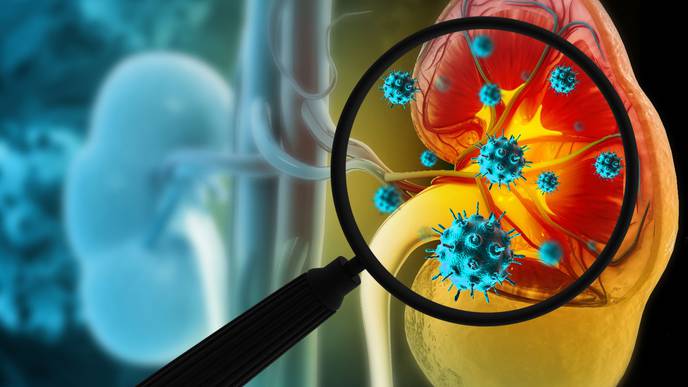ReachMD
Be part of the knowledge.™Chronic Kidney Disease in Children: New Drug Study

Children with the hereditary disease "Alport syndrome" suffer from premature scarring and aging of the kidneys. As a result, the kidneys become inflamed, kidney function deteriorates, blood and high amounts of protein are excreted in the urine, and hearing loss and eye damage can often occur. Many patients are already dependent on kidney replacement therapies in their early thirties and require a donor kidney. The quality of life and life expectancy are reduced significantly. In Germany, about 1,000 children are currently affected. Due to the lack of alternative therapies, pediatric kidney specialists start to treat children with chronic kidney disease with drugs such as dapagliflozin, which is currently only approved for adults.
For the first time, physicians at the University Medical Center Göttingen (UMG) under the leadership of Prof. Dr. Oliver Gross, Senior Physician in the Department of Nephrology and Rheumatology at the UMG, are investigating the efficacy and safety of dapagliflozin in more than 100 young patients in the early stages of chronic kidney disease. The Deutsche Forschungsgemeinschaft (DFG) is funding the nationwide DOUBLE PRO-TECT study with approximately 1.3 million euros over three years. The study aims to establish an effective and safe treatment that delays kidney failure and increases the life expectancy of children with chronic kidney disease. "I am particularly pleased that our study can now be carried out after five years of planning", says Prof. Gross: "The use of adult drugs in children is not unusual. The regulatory authorities in the U.S. and Europe generally require manufacturers to conduct systematic testing in children. However, this obligation does not apply to this group of substances due to a special regulation. This poses risks, because children are not small adults from a medical point of view. The effects, side effects and long-term consequences cannot be transferred from adults to children," adds Prof. Gross.
A total of 102 young patients with Alport syndrome between the ages of 10 and 39 will participate in the study over a total period of three years. They will be divided into two groups: one group will be treated with the drug dapagliflozin, while the other group will receive a drug-free therapy, a placebo, and serve as a control group. The kidney-protective effect of the drug will be assessed based on kidney protein excretion at 48 weeks and preservation of renal function at 52 weeks, and the results will then be compared. "One challenge of the study was that the disease is rare and many participants are still children. Therefore, we have to manage with a relatively small number of participants. In order to obtain scientifically reliable study results, we use particularly efficient methods in planning and evaluation", says the study's chief statistician Prof. Dr. Tim Friede, Director of the Institute of Medical Statistics at UMG: "Here we benefit from the long-standing and intensive cooperation with Prof. Gross and his team, in that we can now bring our experi-ence from various other projects on chronic kidney disease into the new study", adds Prof. Friede.
"Time is pressing for the clinical trial: the more successful the dapagliflozin treatment of adults with severe kidney disease is, the greater the risk that more children with chronic kidney disease will be treated with this drug without sufficient knowledge of its effects, side effects and risks", says Prof. Gross: "The dapagli-flozin used for the study, as well as the placebo, will be fully financed by funding. This allows us to make the study completely independent from industry."
The study was designed together with Dr. Jan Boeckhaus, assistant physician at the Department of Nephrology and Rheumatology at UMG, and is coordinated by the UMG study center. Furthermore, international experts are involved as a steering group, whose expertise enables the planning of the study at the highest international level: Prof. Dr. Christoph Wanner, former Head of Nephrology at the Medical Clinic and Polyclinic I at the University Hospital Würzburg, and President of the European Society of Nephrology, Prof. Dr. Hiddo Heerspink, Clinical Pharmacologist in the Department of Clinical Pharmacy and Pharmacology at the University Medical Center Groningen, in the Netherlands, and renowned expert on dapagliflozin, Prof. Dr. Lutz Weber, Head of Pediatric Nephrology and Managing Senior Physician, Children’s Hospital University Hospital Cologne, and President of the German Society for Pediatric Nephrology, Dr. James Simon, Medical Director at the Cleveland Clinic in Cleveland, USA, and Alport expert, Andre Weinstock, patient representative of the American patient group (Alport Syndrome Foundation), and Christoph Wagner, patient representative of the German patient group (Alport-Selbsthilfe).
The DOUBLE PRO-TECT Alport study follows on the EARLY PRO-TECT Alport study funded by the German Federal Ministry of Education and Research (BMBF), which was conducted in 2012 and 2019, also under the leadership of Prof. Gross, as the world's first therapy study in children for the treatment of Alport syndrome.
Facebook Comments